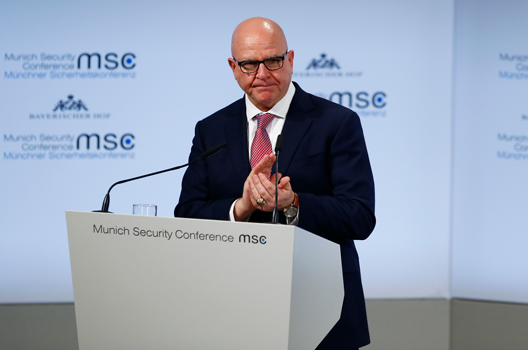
Atlantic Council President and CEO Fred Kempe reflects on H.R. McMaster’s last public speech as National Security Advisor
Lt. Gen. H.R. McMaster’s last public speech as President Trump’s national security advisor was more of a warning than a valedictory.
It was delivered with elegance, passion and power at the Atlantic Council, closing a dinner we hosted to honor the three Baltic States and the 100th anniversary of their first independence, shortly after their presidents’ meeting with President Trump.
It was simultaneously the celebration of a failure and one of resilience, in that the Baltic States’ initial freedom was short-lived, snuffed out by Soviet occupation after just 20 years, only to be regained 51 years later through the courage of the Baltic peoples and their Western supporters—and with the collapse of the Soviet empire.
McMaster’s underlying message to an audience that included the Estonian and Latvian presidents, with whom I had moderated a panel that also included the Lithuanian foreign minister just a few minutes earlier, was that history’s outcomes aren’t predestined but are shaped by the most determined actors. Until recently, that has been Putin.
McMaster’s service this past week was his authenticity as a military hero and impressive intellect, as an individual of integrity who chose the moment to cut through the fake news and partisan blather to lay out the case against Putin and place it in the disturbing context of our times.
It’s worth reading the transcript in full. But here are excerpts that ought not be missed:
“Tonight, we celebrate this proud history at a critical moment for our nations and the world — critical because we are now engaged in a fundamental contest between our free and open societies and closed and repressive systems. Revisionist and repressive powers are attempting to undermine our values, our institutions, and our way of life.”
He catalogued the serial crimes, a litany of unanswered assaults.
“Since the denial-of-service attacks on Estonia in 2007 and the invasion of Georgia in 2008, Russia has used old and new forms of aggression to undermine our open societies and the foundations of international peace and stability. Estonia, Latvia and Lithuania have all been targeted by Russia’s so-called hybrid warfare, a pernicious form of aggression that combines political, economic, informational and cyber assaults against sovereign nations. Russia employs sophisticated strategies deliberately designed to achieve objectives while falling below the target state’s threshold for a military response. Tactics include infiltrating social media, spreading propaganda, weaponizing information, and using other forms of subversion and espionage.”
Then came McMaster’s indictment of the US and others.
“For too long, some nations have looked the other way in the face of these threats. Russia brazenly and implausibly denies its actions, and we have failed to impose sufficient costs.”
Thus, we reap the whirlwind of our inattention, whether it be through Russia’s occupation of Crimea and intervention in Ukraine, through its support of the murderous Syrian regime of Assad, or via its poison attack in Salisbury, England.
“The Kremlin’s confidence is growing as its agents conduct their sustained campaigns to undermine our confidence in ourselves and in one another,” he said. “Last month, Russia used a military-grade nerve agent in an attempted murder that endangered the lives of 130 people, including many children. This attack was the first offensive use of nerve agent in Europe since the Second World War. It was an assault on the United Kingdom’s sovereignty. And any use of chemical weapons by a state party is a clear violation of the Chemical Weapons Convention.”
McMaster’s words were carefully selected, and they included suggestions for a more concerted response. Given the occasion of his final public outing as US national security advisor, they were laden with meaning for President Trump.
As if in response to McMaster’s warning, the week ended with new, long-awaited US sanctions against Russian companies, individuals and officials, listed in detail in the much-downloaded US Treasury Department press release.
“The Russian government operates for the disproportionate benefit of oligarchs and government elites,” said Treasury Secretary Steven T. Mnuchin in announcing the expanded sanctions. “The Russian government engages in a range of malign activity around the globe, including continuing to occupy Crimea and instigate violence in eastern Ukraine, supplying the Assad regime with material and weaponry as they bomb their own civilians, attempting to subvert Western democracies, and malicious cyber activities. Russian oligarchs and elites who profit from this corrupt system will no longer be insulated from the consequences of their government’s destabilizing activities.”
One can only hope McMaster’s words and prescriptions are embraced by his successor and sway a reluctant president.
Fred Kempe is president and chief executive officer of the Atlantic Council. You can follow him on Twitter @FredKempe. This blog post is based on his weekly InflectionPoints newsletter. Read the newsletter in full here.
Image: US National Security Advisor H.R. McMaster talks at the Munich Security Conference in Munich, Germany, February 17, 2018. (REUTERS/Ralph Orlowski)
